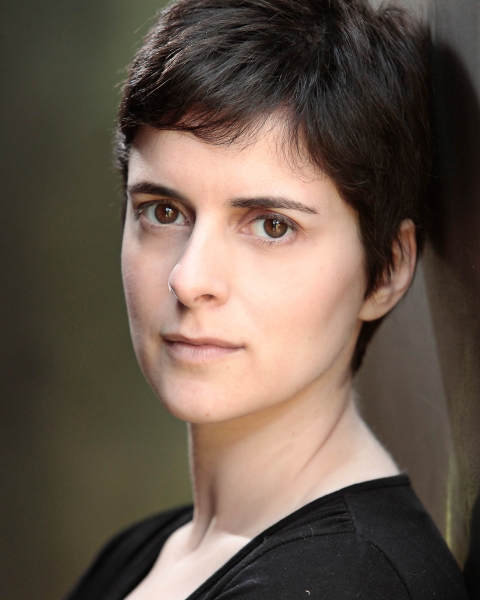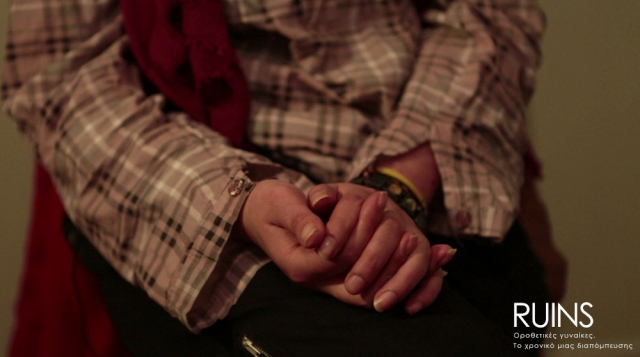Photos: http://ruins-documentary.com/
Anastasia Balezdrova
Shortly before the parliamentary elections in May 2012 the news that the police had seized a prostitute, a carrier of the AIDS virus, "exploded" in the Greek media space. The number of arrested women had reached 18 by the date of the elections, and all media had published their names and pictures.
 The developments had provoked angry reactions from non-governmental organizations involved in the protection of HIV-positive people. However, serious charges were brought against the women and they were sent to the prison in Korydallos.
The developments had provoked angry reactions from non-governmental organizations involved in the protection of HIV-positive people. However, serious charges were brought against the women and they were sent to the prison in Korydallos.
Few people in Greece remember them only a year after the developments. According to young director Zoe Mavroudi the story of these women should not be forgotten. In the documentary "Ruins" she tells the story of 31 women who were arrested, forced to be tested for AIDS and accused of felony, and whose photos and personal data had become public before a lawsuit against them.
The idea of the film
"The idea occurred to me when I saw this inhuman circus. I was shocked as a person by the actions of the authorities. I really could not believe my eyes and I had immediately perceived the developments as something that would change everything. It was a sign of how much my country has changed.
As a woman, I perceived them as an unprecedented case of turning women into a "target". I cannot think of another case in Greek history, at least over the past 39 years, when women have been affected in such a selective and brutal manner.
So, I decided to present the story in some way. At first, I did not know how far I would go because a documentary requires a lot of things. But the first thing is to take the decision to film it and I did so immediately."
The story of the women
The film presents interviews with two women and with the mothers of another two women. The other participants are members of non-governmental organizations involved in the fight against AIDS, members of the initiative for solidarity, the defender of one of the women, one journalist and doctors from two hospitals in Athens.

"The film does not contain portraits of the women and of their daily lives. We filmed the interviews but it was difficult to conduct them under these hard conditions and, in addition, we had very little time. They told us about a very traumatic experience and this required a lot of effort and attention on my part. The members of the initiative for solidarity with HIV-positive people under persecution helped complete the interviews. From the first moment they started to visit the prisons where the women had been sent, helping them in the fight with the judicial authorities and in connection with their stay in prison. They did not leave them until the last moment and continue to support women imprisoned in the wing for HIV-positive people."
Chronicle of events
"The case became public when the photo of a woman from Russia was published. It had appeared on the website of the police first and then subsequently in all media. The reports claimed that she had been caught in an illegal brothel on Acharnon Street. All this happened at the end of April 2012, a few days after the order issued by the Minister of Health at the time, Andreas Loverdos. In practice, it allowed discrimination of vulnerable groups affected by different viruses, including HIV. A few days later a massive operation had apprehended hundreds of women. Policemen had taken them to police stations, subjecting them to the so-called rapid test, which is actually the first stage of the process to determine whether a person is a carrier of the AIDS virus. In this case, it was announced, only on the basis of the rapid test, that the women were HIV positive. 31 women were photographed, appeared before the investigator and detained while awaiting trial. They were charged with inflicting severe intentional injury to the degree of felony and with illegal prostitution. After several weeks in custody the women were transferred to the prison in Korydallos where they spent 10 months, the last of them being released this March.
An important element in the film is constituted by the words of the lawyer who states that an attempt was made at first to announce that the women were of foreign origin. It turned out that 70-80% of them were of Greek origin and were not prostitutes which shows that racism against women from the Eastern Bloc still exists in Greek society. The Minister’s statements were in the same vein, namely that women from sub-Saharan Africa carried the AIDS virus and spread it through prostitution. But, as one of the participants in the film says, "The HIV virus is not as aggressive as the authorities in this case."
Charges and prison